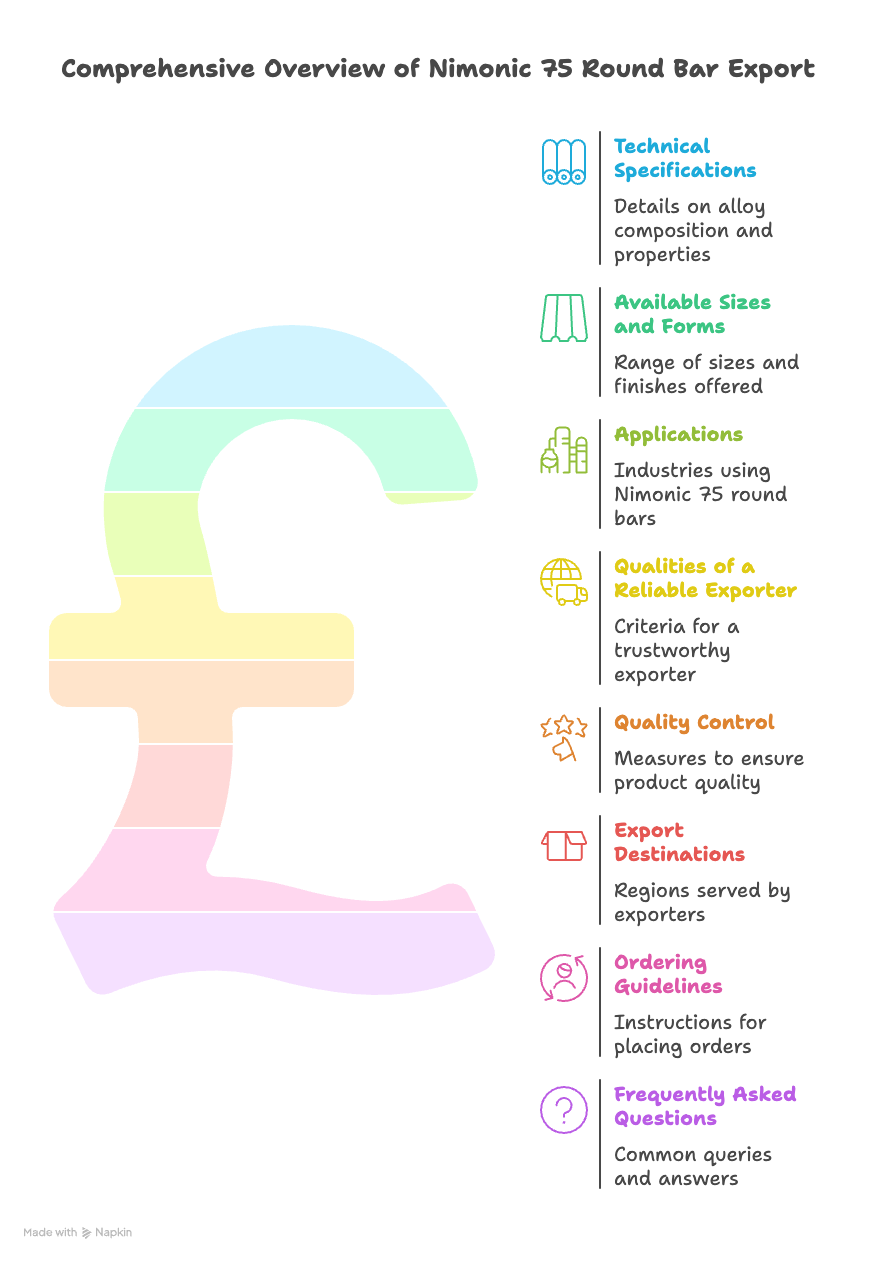Nimonic Alloy 75 Round Bar is a high-performance nickel-chromium alloy known for its excellent mechanical properties and oxidation resistance at elevated temperatures. It is widely used in industries such as aerospace, power generation, chemical processing, and heat treatment. Exporters of Nimonic 75 round bars play a crucial role in supplying these high-quality materials to global customers who require certified products that meet international standards.

Technical Specifications of Nimonic 75 Round Bar
| Specification | Details |
|---|---|
| Alloy Designation | Nimonic 75 / UNS N06075 / W.Nr. 2.4951 |
| Chemical Composition | Nickel: 70% min, Chromium: 18–21%, Titanium: 0.2–0.6%, Iron: 5% max, Carbon: 0.08–0.15% |
| Density | 8.37 g/cm³ |
| Melting Point | 1390–1420 °C |
| Tensile Strength | Approx. 750 MPa |
| Yield Strength | Approx. 275 MPa |
| Elongation | 40–45% |
Available Sizes and Forms
| Form | Size Range | Finish |
|---|---|---|
| Round Bar | 3 mm to 300 mm Diameter | Bright, Polished, Black, Peeled, Turned |
| Forged Bar | Up to 400 mm Diameter | Rough Turned or Machined |
| Custom Cut Lengths | As per customer requirements | Precision Tolerance Available |
Applications of Nimonic 75 Round Bars
| Industry | Application |
|---|---|
| Aerospace | Gas turbine components, exhaust ducts, fasteners |
| Power Generation | Boiler components, heat exchangers, combustion chambers |
| Chemical Processing | Reactor parts, valve seats, piping in corrosive environments |
| Industrial Furnaces | Fixtures, trays, jigs, and baskets used in high-temperature operations |
Qualities of a Reliable Nimonic 75 Round Bar Exporter
| Criterion | Description |
|---|---|
| Certification | Should provide Mill Test Certificates (EN 10204 3.1) verifying chemical and mechanical properties. |
| Product Range | Availability of multiple diameters, lengths, and surface finishes for diverse industries. |
| Export Experience | Experience in international logistics, customs documentation, and sea/air freight handling. |
| Packaging | Use of seaworthy wooden boxes or pallets to prevent oxidation or mechanical damage. |
| Customization | Ability to produce bars to customer specifications with precise machining and cutting services. |
How Exporters Ensure Quality Control
Exporters of Nimonic 75 round bars maintain strict quality procedures throughout production and shipment. Each batch is tested for mechanical strength, chemical consistency, and dimensional accuracy. Non-destructive testing methods such as ultrasonic inspection, eddy current testing, and hardness measurement are commonly applied. Exporters also provide traceability through batch numbers and certified test reports to guarantee reliability and compliance with global standards.
Typical Export Destinations
Major exporters of Nimonic 75 round bars serve clients across Europe, the Middle East, Southeast Asia, and North America. Industries in these regions depend on Nimonic alloys for manufacturing turbine components, high-temperature fasteners, and furnace parts. Exporters usually handle international standards such as ASTM, DIN, and BS grades, ensuring the material’s global compatibility.
Ordering Guidelines
When purchasing from an exporter, customers should provide clear requirements including diameter, tolerance, surface finish, and packaging preferences. Exporters can supply quotations based on quantity and delivery location. It is also recommended to request inspection reports, export documents, and MTC copies before finalizing the order.
Frequently Asked Questions
Q1: What is the typical size range for Nimonic 75 round bars?
They are commonly available from 3 mm up to 300 mm in diameter, with custom machining for larger dimensions.
Q2: Do exporters provide certifications with Nimonic 75 round bars?
Yes, reputable exporters provide Mill Test Certificates verifying chemical composition, mechanical properties, and heat number traceability.
Q3: Which industries commonly import Nimonic 75 round bars?
They are frequently exported to the aerospace, power generation, and chemical processing industries where high-temperature resistance is essential.



